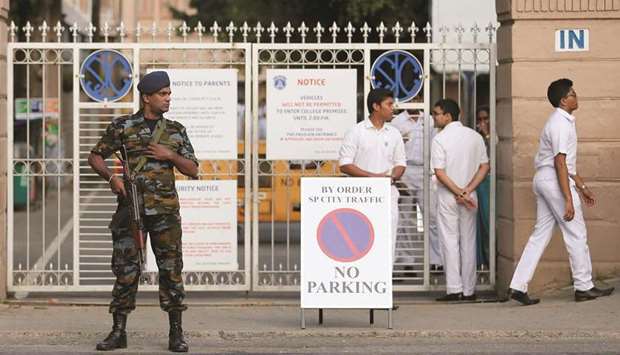Sri Lanka’s president extended yesterday by a further month the state of emergency imposed immediately after the Easter Sunday bombings that killed 258 people.
Maithripala Sirisena issued a proclamation saying that the emergency, which gives sweeping powers to security forces to arrest and detain suspects for long periods of time, would continue for another 30 days, citing “public security”.
Sri Lanka initially imposed the emergency to crack down on local jihadists blamed for the April 21 bombings that targeted three churches and three luxury
hotels.
Three weeks after the suicide bombings, anti-Muslim riots broke out in a province north of the capital in a backlash against the attacks. At least one Muslim man was killed and hundreds of Muslim-owned shops and homes were destroyed. Several mosques were also vandalised.
The police and the military say they have arrested scores of suspects, both in connection with the bombings and over what appeared to be organised violence against the Muslim minority.
The authorities say they have neutralised the jihadist threat after arresting almost all those involved in the Easter attacks, but troops and police
remain on alert across the island.
Christians make up 7.6% and Muslims 10% of mainly
Buddhist Sri Lanka.
FAKE NEWS RAMPANT: Sri Lankan social networks saw a surge in fake news after the Easter suicide bombings a month ago despite an official social media blackout, highlighting the inability of governments to contain disinformation, experts said.
A nine-day ban on platforms including Facebook, Twitter, YouTube, Instagram and WhatsApp was introduced following the Islamic State-claimed attacks on churches and hotels on April 21.
Many anxious social media users switched to virtual private networks (VPNs) or the TOR network to bypass the order and keep communication open with friends and relatives as the extent of the carnage became clear.
But for others, the tools were a means to spread confusion and vitriol as the island struggled to come to terms with one of the worst terror attacks in its
history.
Sanjana Hattotuwa, who monitors social media for fake news at the Centre for Policy Alternatives in Colombo, said the government blackout had failed to prevent “engagement, production, sharing and discussion of Facebook content”, and that he had seen a significant increase in false reports.
AFP has published half a dozen fact-checks debunking false claims made on Facebook and Twitter after the Easter attacks.
Some had dug out photos of coffins and funerals from Sri Lanka’s brutal decades-long civil war and claimed they showed victims of the blasts.
One video posted to Facebook showed police arresting a man dressed in a burqa and claimed he was involved in the bombings. The video was actually from 2018, and showed a man who had used a burqa to hide his identity while he sought to attack someone over a debt issue.
Another used a five-year-old photo from India that showed a group of men wearing T-shirts with “ISIS”, another name for Islamic State, written on them to claim there was an active IS cell in eastern Sri Lanka.
One Twitter user claiming to be a high-ranking Sri Lankan army brigadier used the platform to accuse neighbouring India of being involved in the attacks. The account was later taken down by Twitter after the Sri Lankan army complained.
Authorities in Sri Lanka – where ethnic divisions still linger after decades of war – previously blocked Facebook in March 2018 after Buddhist hardliners used incendiary posts to fan religious violence that left three people dead and reduced several hundred homes and shops to ashes.
The surge in fake news has further blemished the troubled reputation of social media – which several years ago had been seen as a means to expand freedom of information – in the region.
Since the attacks, Sri Lankan authorities have imposed other short bans on social media, including earlier this month after mobs in the northwestern town of Chilaw attacked Muslim-owned businesses in anger at a Facebook post by a shopkeeper.

A Sri Lankan soldier stands guard at the entrance of a school after all Catholic schools reopened after a month.
